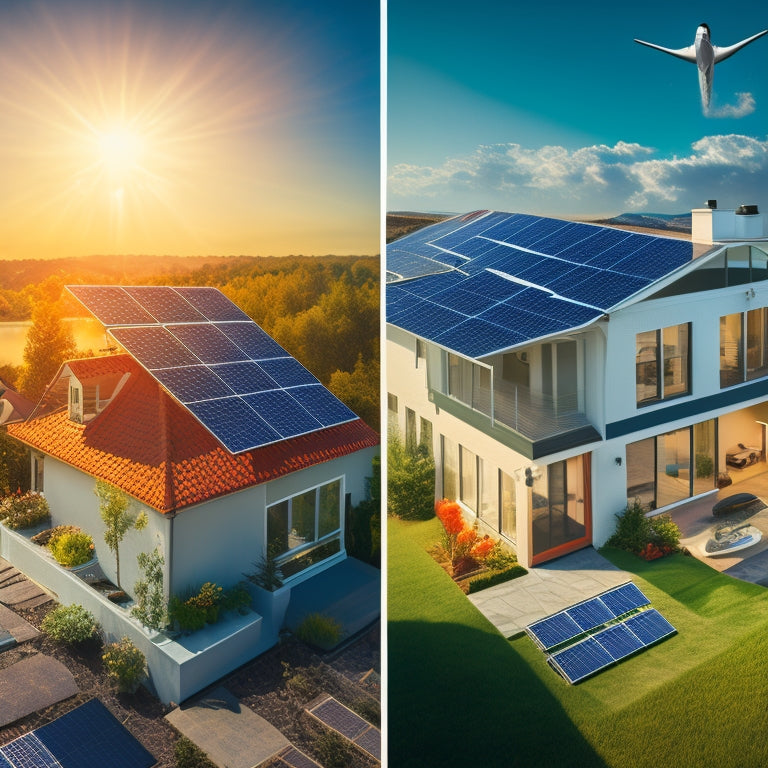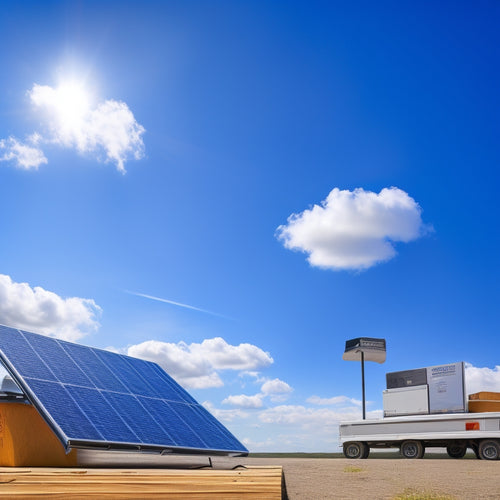
5 Key Factors Affecting Residential Solar Panel Costs
Share
When considering residential solar panels, you'll find that five key factors affect the upfront cost. The size and quality of your system, including efficient panels with high durability, impact costs. The installation company and labor also play a role, as experienced technicians reduce labor costs. Your roof's size and complexity, including obstacles like skylights, add to the overall cost. Local incentives and rebates, varying by location and utility company, can greatly lower costs. Finally, permits and inspection fees, ranging from hundreds to thousands of dollars, must be factored in. Understanding these factors will help you better grasp the overall cost of your solar energy system, and there's more to explore to get a complete picture.
Key Takeaways
• System size and quality impact upfront costs, with larger, high-efficiency systems being more expensive but generating more power per hour of sunlight.
• Installation company and labor costs vary depending on the installer's experience, team size, and certifications, affecting overall system cost.
• Roof size and complexity influence system cost, with factors like orientation, skylights, and obstacles requiring more hardware and labor.
• Local incentives and rebates, such as state credits and utility discounts, can significantly reduce upfront costs and vary by location and utility company.
• Permits and inspection fees, including building, electrical, and zoning permits, add to the overall cost and vary by area and jurisdiction.
System Size and Quality
When evaluating residential solar panel costs, the system size and quality you choose have a significant impact on the overall expense, with a larger, high-efficiency system typically resulting in a higher upfront cost. As you consider your options, keep in mind that a more efficient system will generate more power per hour of sunlight, making it a worthwhile investment in the long run.
Efficiency ratings, typically measured in percentages, indicate how well a panel converts sunlight into electricity. Look for high-efficiency panels with ratings above 20% for best performance. Additionally, panel durability is essential, as it directly affects the system's lifespan and overall value. Durable panels with a longer warranty period (25 years or more) will provide you with a reliable source of power for years to come.
Installation Company and Labor
Your choice of installation company and labor can greatly impact the overall cost and quality of your residential solar panel system. A reputable installer with experienced technicians can guarantee a safe and efficient installation process. When selecting an installation company, consider their work experience and team size. A company with a larger team size and extensive work experience can complete the installation process more efficiently, reducing labor costs.
Additionally, an experienced team can identify potential issues and provide customized solutions, ensuring your system is optimized for maximum energy production.
It's essential to research and compare installation companies to find the best fit for your project. Look for companies with certified technicians and a proven track record of successful installations. Be wary of companies with limited work experience or a small team size, as they may lack the expertise and resources to complete the installation efficiently.
Roof Size and Complexity
The size and complexity of your roof play a significant role in determining the overall cost of your residential solar panel system. Larger, more complex roofs demand more materials and labor to guarantee a secure and efficient installation.
When it comes to your roof's size and complexity, several factors can impact the cost of your solar panel system. These include:
-
Roof orientation: If your roof has multiple orientations or angles, it may require more mounting hardware and labor, increasing the cost.
-
Skylight placement: The presence of skylights or other obstructions can affect the placement and number of solar panels, adding to the overall cost.
-
Roof material: Different roofing materials, such as tile or metal, may require special installation equipment or techniques, increasing the cost.
-
Roof pitch: Steeper roofs may require more labor and equipment to ensure safe installation, adding to the cost.
-
Obstacles and shading: Trees, vents, or other obstacles that cast shade on your roof can reduce the system's efficiency and increase the cost.
Local Incentives and Rebates
Six states and numerous local governments offer incentives that can greatly reduce the upfront cost of your residential solar panel system. You may be eligible for state credits, which can provide a significant reduction in your overall cost.
Additionally, some utility companies offer discounts to customers who install solar panels. These utility discounts can be a one-time rebate or an ongoing reduction in your electricity rates. You'll need to research the specific incentives available in your area, as they vary widely.
For example, some states offer a credit against your state taxes, while others provide a rebate based on the system's size or energy output. Be sure to factor these incentives into your overall cost calculations, as they can make a significant difference in the affordability of your solar panel system.
Permits and Inspection Fees
Before installing a residential solar panel system, you'll need to secure necessary permits and undergo inspections, incurring fees that can range from a few hundred to several thousand dollars, depending on your location and system size.
These fees vary greatly due to jurisdictional variations in permitting processes and fee structures.
You'll need to factor in the costs of:
- Building permits
- Electrical permits
- Zoning permits
- Inspections (electrical, roofing, and fire safety)
- Plan review fees
Understanding the permit and inspection requirements in your area is vital to accurately estimating the total cost of your solar panel system. Be sure to research the specific regulations and fees in your jurisdiction to avoid surprises down the line.
Keep in mind that some jurisdictions may have different fee structures for residential and commercial installations, so it's important to verify the requirements specific to your project.
Frequently Asked Questions
How Long Does a Typical Solar Panel System Last?
"You'll be impressed to know that did you know 80% of solar panels installed in the 1980s still operate at 95% capacity? A typical solar panel system lasts around 30 years, with system durability backed by a 25-year warranty period, ensuring your investment pays off."
Can I Install Solar Panels on a Rented Property?
Before installing solar panels on a rented property, you'll need to obtain your landlord's approval, as specified in your rental agreements, to secure a harmonious and legally binding arrangement.
Are Solar Panels Resistant to Hail and Extreme Weather?
You'll be relieved to know that solar panels are designed to withstand harsh weather conditions, including hail and extreme weather, thanks to their durable materials and storm-resistant construction, ensuring uninterrupted power supply.
Can I Sell Excess Energy Back to the Grid?
You can sell excess energy back to the grid through Net Metering, which measures your production and consumption, and with Energy Storage systems, you can store excess energy for later use, maximizing your solar panel's efficiency.
Do Solar Panels Require Regular Maintenance?
You'll need to perform periodic panel inspections and system cleanings to guarantee peak energy production, as debris and dirt can reduce efficiency, but fortunately, these tasks are relatively simple and can be done yourself or outsourced to professionals.
Related Posts
-

Why Regular Vehicle Panel Maintenance Matters Locally
You know that regular vehicle panel maintenance is essential to optimize your vehicle's performance, energy efficienc...
-

7 Essential Tips to Buy Discounted Solar Panels Online
When purchasing discounted solar panels online, you'll want to research top brands like SunPower, Panasonic, and LG, ...
-

5 Best Online Stores for Green Vehicle Solutions
You're on the hunt for an eco-friendly ride, and online stores are a great place to start. You'll find top retailers ...


